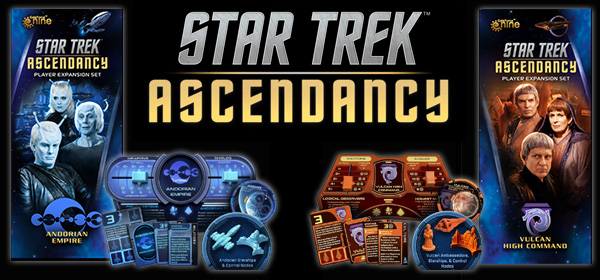
Star Trek: Ascendancy must be a more popular game than I thought. Usually I think of Star Trek games as being pretty niche and unlikely to find widespread success. But Ascendancy must be doing well because 8 years later, Gale Force 9 is still pumping out expansion packs and new accessories. Ascendancy deserves it. It's a fantastic game! In fact, it might very well be my favorite tabletop game at the moment.
The Vulcan and Andorian expansions were both released a few years ago, in 2019. But I couldn't review them near their release because I hadn't had an opportunity to play either of them until this past year or so. That's partly due to the fact that Gale Force 9's distribution isn't the best. The expansions were delayed several times, and my pre-orders were also late arriving. By the time I finally had them both, schedules just weren't favorable for playing. I had an opportunity to play with either faction within a few months of purchasing them, but we ended up sticking with the Ferengi and Cardassians.
We expected to play again soon and break in the Andorian and Vulcan sets, but then COVID happened. Ascendancy wasn't the only victim, as several other games (including Bloodborne, Tapestry, and U-Boot) have also sat un-opened or un-played since the summer of 2019.
Several games (or expansions) have sat un-opened or un-played since 2019 and 2021 thanks to COVID.
Now, GF9 has released another pair of expansions in 2022, with the Dominion War and Breen. This time, I didn't want to wait and risk letting them sit un-played for another 2 or 3 years, so we made sure to find time to play. Though reviews were still very late because I had 4 expansions to play and review instead of just 2. Which means it took quite a few play sessions to play everything and get a decent feel for it all.
It certainly helped that I introduced the game to some new players in the year or 2 following COVID, and they all loved it. I've now played with all the new factions and have impressions on all of them. I'll discuss the Dominion in a separate post, since the Dominion is a lot more complicated than simply being a new faction. It includes new rules for the Bajoran wormhole, Gamma Quadrant systems, and also includes a team variant game mode based on the Dominion War of Deep Space Nine. So for now, I'm going to cover the Andorians, Vulcans, and Breen.
Pre-Federation factions
The pair of 2019 expansions were both themed around Star Trek: Enterprise, offering versions of Federation-member cultures that represent their pre-Federation empires. I have to say, I was very surprised to see these factions be announced. Partly because they are both members of the Federation, and so don't seem like "big enough" galactic powers to warrant their own factions. To me, it seemed comparable to seeing the Virginia Commonwealth or Republic of Texas show up as a playable civilization in Sid Meier's Civilization.
But it was also a confounding release because I was expecting to see the Tholian faction that was promised by the base game's "Crystalline Entity" exploration card. I would have expected to see factions like the Dominion, Tholian, Gorn, or maybe even a Delta Quadrant faction like the Hirogen or Kazon, before seeing the Vulcans and Andorians show up as factions. Nevertheless, both introduce novel new gameplay mechanics and concepts, and show the development team at Gale Force 9 is getting quite creative with its faction concepts. [More]
c8602238-1f38-43f7-b62e-db5a7d8d9a68|0|.0
Tags:Star Trek, Star Trek: Ascendancy, Gale Force Nine, board game, expansion, Vulcan, Andorian, Breen, Dominion, lie, ambassador, research, isolationist
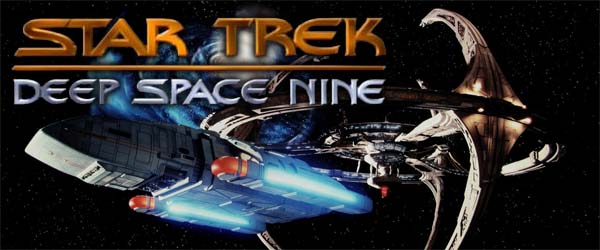
In the age of streaming and binge-watching here in the year 2023, long-form serialized television is now ubiquitous. Every network and streaming service has wanted its own blockbuster TV shows. Whether it's AMC's The Walking Dead and Breaking Bad, HBO's Game of Thrones, Sci-Fi's Battlestar Galactica, Netflix's House of Cards and Stranger Things, History's Vikings, and so forth, it seems that every big new show outside of sit-coms has a heavily-serialized format. Procedural dramas are going the way of the dinosaur.
Serialized, long-form television may be commonplace now, but back in the 1990's, it was virtually unheard of outside of daytime soap operas (such as Dallas and Dynasty) and the occasional network mini-series. At least, this was the case in the United States. British television has a much longer track record of serialized story-telling. A big part of why serialized television was uncommon was that the producer(s) of network syndicacted shows didn't have as much control over when its affiliates decided to air the shows, or how heavily they would market and advertise it. Furthermore, the networks or affiliates could change the time slot of the show pretty much at a whim. Viewership, therefore, would be much more fickle and fractured. Audiences would pop in and drop out. Expecting the audience to have seen every previous episode in preparation for this week's episode was a dangerous and risky expectation for a production studio. It's easy to lose viewers if none of them know what's going on.
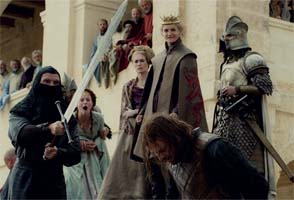 - Game Of Thrones, copyright HBO
- Game Of Thrones, copyright HBO
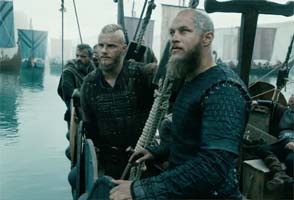 - Vikings, copyright History Channel
- Vikings, copyright History Channel
Highly serialized, long-form drama are the norm for modern networks and subscription television services.
As I mentioned in the previous essay, this was the case with me. I was in elementary school and middle school during DS9's run, and I missed a lot of episodes in the first couple seasons, despite wanting to watch the show. Missing so many episodes meant that I had very little idea what was going on when I would watch, and so I mostly lost interest in the show. If my dad was watching it, and I was there, I'd watch it, but I wasn't planning my day around it.
Looking back now, that sort of serialized story-telling is now ubiquitous and expected, and so it's easier to recognize that Deep Space Nine was truly innovative and ahead of its time in this regard.
Long-form story-telling
Serialized story-telling wasn't alien to Star Trek. Deep Space Nine premiered in 1993, the same year as the sixth season of Next Generation. By this time, The Next Generation had several story threads that had recurred over the course of a season, or over multiple seasons -- as well as several attempted overarching plot threads that were dropped.
As early as the first season of Next Generation, Q had become a recurring antagonist, and his "judgement" over the human race was established as a recurring plot thread. Heck Q's judgement of humanity was originally depicted as the framing mechanism for the entire show! It was scaled back in the following seasons due to the general poor reception of the first season, and the fact that John de Lancie just works better in a more whimsical and comic role.
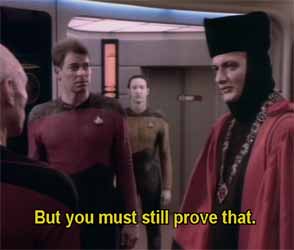 - TNG "Encounter At Farpoint", season 1, episode 1
- TNG "Encounter At Farpoint", season 1, episode 1
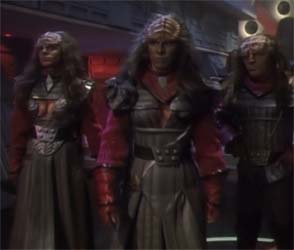 - TNG "Redemption, Part I", season 4, episode 26
- TNG "Redemption, Part I", season 4, episode 26
TNG had several recurring plot threads.
The final two episodes of Next Generation's first season, "Conspiracy" and "The Neutral Zone", seem to have been part of an abandoned attempt at more long-form story-telling. Both seem to be trying to establish some new threat to the Federation (and possibly a shared threat between the Federation and other rival powers such as the Romulans). I think the original idea was for this to become an overarching storyline for the entire series. But the thread from "Conspiracy" was completely dropped, and the destroyed colonies referenced in "The Neutral Zone" were re-written to be retroactive foreshadowing of the Borg's appearance in season 2.
[More]
cddb26c9-ca5a-4327-b199-d0d00dec522b|0|.0
Tags:Star Trek, Star Trek: Deep Space Nine, Federation, Starfleet, progressivism, humanism, secularism, religion, fundamentalism, fascism, terrorism, war, trans-gender, Worf, Odo, Quark, Moogie, Ishka, Bajor, Dominion, Founder, Changeling, Jem'Hadar, Cardassian, streaming television, Game of Thrones, Battlestar Galactica, the X-Files, Babylon 5, Buffy the Vampire Slayer, The Sopranos, Lost, Twin Peaks

The Next Generation, Deep Space Nine, and (depending on who you talk to) Voyager are widely regarded as the "Golden Age" of Star Trek. Since many Trekkies look back at this time period of the late 80's and 90's with the rose-tinted glasses of nostalgia, it might surprise you to read that Deep Space Nine used to be a highly divisive topic among Star Trek fans. Even to this day, I've talked to "hardcore" Trek purists who dislike Deep Space Nine because of how dark and conflict-driven the series is. I can't imagine what these people must think of the Kelvin-verse reboots, Star Trek: Discovery, or Picard. If you think I'm hard on those recent iterations of Star Trek, then you should talk to these people!
In any case, the idea that DS9 is too dark and conflict-driven is a valid criticism from someone coming from the perspective of a fan of The Original Series and Next Generation. Both of those shows were about an idealistic future in which humanity had grown out of its petty squabbles and now seeks to better itself through cooperative exploration and colonization of space. Deep Space Nine didn't quite accept those ideas at face-value. Deep Space Nine's more pragmatic approach had some fans believing that Deep Space Nine violated the spirit of Star Trek.
Many fans of The Original Series and Next Generation criticized Deep Space 9 for being "too dark".
Deep Space Nine was also the first Trek series to be highly serialized, having a singular, overarching plot throughout most of the series, and with frequent mini-arcs running for half a season or a whole season. TNG had its share of recurrent story arcs. Q's "trial of humanity" was pitched as a framing mechanism for the entire show, but ended up only serving to bookend the series, while relegating most of Q's appearances each season as comic tangents. There were other recurrent sub-plots as well, such as Worf's discommendation from the Klingon Empire and his conflict with the Duras House in the "Sins of the Father" arc, the Borg story thread, Data's relationship with his brother Lore, Wesley's training as a Starfleet officer, and a few others. But TNG stayed mostly episodic. Almost all the single episodes of TNG (and the two-parters as a whole) can be enjoyed independently, without having seen any previous episodes of TNG. That was not the case with DS9.
I missed many episodes of DS9 because
it aired on weekend evenings.
DS9 was on the air throughout my elementary school and middle school years (I was seven when the show premiered). It frequently aired (syndicated on Fox in my region) on weekend evenings, and I was often outside playing tag, riding bikes, or playing touch football or street basketball with neighbor kids. As such, I missed a lot of episodes. Due to the highly-serialized nature of the show, when I would see an episode, I would have no idea what was going on! Because I rarely watched the show, and didn't understand it when I did see it, I didn't particularly like it. I'd still watch it, because it was still Star Trek. In fact, Voyager was the first Star Trek series that I watched regularly (it being on Wednesday nights, when I wasn't outside playing), and, well, you all know how I feel about Voyager.
In fact, I grew up with a bit of a preconceived notion that Deep Space Nine was the "bad" Star Trek series -- even though critics at the time largely appreciated it. On the off chance that I could talk about Star Trek with a peer, they generally didn't like DS9 either -- for many of the same reasons.
It wasn't until my college years, when the show was released for sale on DVD that I sat down and watched the whole series from start to finish. At first, I wasn't even sure if I wanted to bother buying the DVDs. After all, DS9 was "the bad Star Trek". So why spend the money? And those DVDs cost a lot of money! CBS wanted something like $120 for a single season, compared to $30 or $40 a season for shows like E.R. or Grey's Anatomy. At least the Next Gen DVDs came in fancy, sturdy boxes. The DS9 DVDs came in cheap, flimsy, rigid plastic booklets that start to fall apart as soon as you open them. I think my mom bought them from Costco for $90 a pop -- a considerable discount, but still obnoxiously expensive!
CBS wanted $120 per season for DS9 DVDs!
I was now older. I was coming to terms with my personal identity as a progressive secular humanist. Most importantly, I could finally follow along with the various multi-episode story threads and the complex, nuanced characterizations. And boy, did my opinions on the series change!
I'll always have a soft spot for Next Generation. That show has my favorite Trek character: Data. And Picard is probably my third favorite character after Spock. After my single favorite episode of Trek, the Original Series' "Balance of Terror", most of my runner-up favorite episodes are TNG episodes. Episodes like "The Measure of a Man", "Who Watches the Watchers", "The Offspring", "The Best of Both Worlds", "Deja Q", "I, Borg", "Tapestry", "The Inner Light", "Darmok", "All Good Things...", and so on...
Despite my fondness for Next Generation, I actually think that Deep Space Nine is the better all-around show.
Every Trek series since the original has taken a couple years to really find its footing. TNG doesn't really figure itself out until midway through season 2, and Voyager takes until the 4th season to figure itself out -- if ever. I don't know if Discovery ever righted its ship, since I didn't bother to watch past the first season, and Picard didn't even become watchable until the third season. I feel like DS9 finds its footing much earlier than TNG or Voyager. Deep Space Nine's characters, themes, and stories start to fall in place by the end of season 1. In fact, one of my favorite episodes of the entire series (and one of my favorite episodes of Trek in general) is a season 1 episode: "Duet". DS9 is the only Trek series (since the original) for which one of my favorite episodes comes as early as the first season.
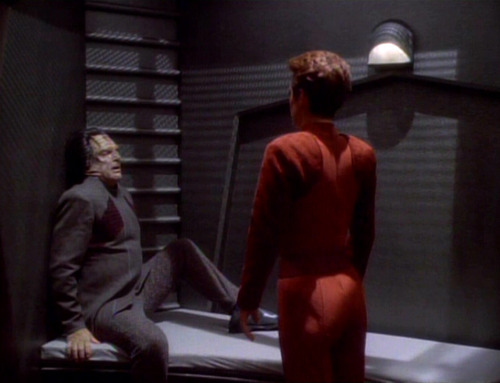 - DS9 "Duet", season 1, episode 19
- DS9 "Duet", season 1, episode 19
One of my favorite DS9 episodes (and Trek episodes in general) is the season 1 Holocaust allegory, "Duet".
The last episode of season 1, "In the Hands of the Prophets" starts to set up the season-long arcs (and a series-long arc) that would become a trademark of the series. That episode introduces us to recurring villain Vedek Winn and starts the process of her gradual accumulation of power, which we'll talk about later.
But despite the series coming together better in the first season, critics of Deep Space Nine aren't wrong when they say that it "feels different" from the Original Series or Next Generation. The show is unarguably darker and more conflict-driven. The entire second half of the series is about an interstellar war, and the seasons leading up to that repeatedly tell stories about domestic terrorism, Holocaust allegories, religious persecution, and cynical politics. These sorts of themes were present in episodes of TOS and TNG here and there, but DS9, at a fundamental level, was about these difficult topics.
[More]
79b833d8-97bd-4e2f-b45e-9f666db1588a|1|5.0
Tags:Star Trek, Star Trek: Deep Space Nine, Gene Roddenberry, Federation, Starfleet, culture, ideals, cooperation, socialism, post-scarcity economics, alien, multi-culturalism, progressivism, humanism, secularism, terrorism, war, Benjamin Sisko, Kasidy Yates, Odo, Quark, Ferengi, Klingon, Cardassian, Dominion, Bajor
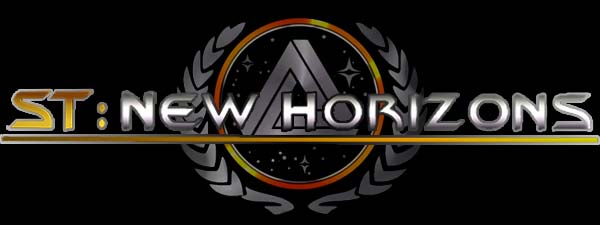
Here's something that I've never done before: a review of a game mod! I don't play mods very often. When I play games, I usually want to play the game that the creators created in order to get a feel for what their intent might have been. For some of the more sandboxy PC games that I play (like Cities: Skylines or the like), I might try some small mods.
There has yet to be an official game quite like Microprose's 1999 release, Birth of the Federation.
For this one instance, however, I'm making an exception because this particular mod fills a very specific niche desire for me that has gone unfulfilled for around 15 or 20 years. The "New Horizons" mod for Stellaris is finally allowing me to play a full 4-x strategy game set in the Star Trek universe. I haven't been able to do that since Star Trek: Birth of the Federation, developed by Microprose for Windows 98!
The creators seem to have been inspired by BotF.
Yes, there have been other Star Trek mods for other games in the past, and there's even some community projects to create spiritual successors to Birth of the Federation (such as Star Trek: Supremacy). The problem is that I've yet to ever see one of these get finished. "New Horizons" for Stellaris is still a work-in-progress, but it is mostly functionally complete and fairly robust. Since Birth of the Federation holds such a special place in my heart, I'm going to take a stab at reviewing "New Horizons" and see how it compares to my personal favorite [official] Star Trek game of all time.
Built on the back of Stellaris
"New Horizons" is, of course, a mod for the PC game Stellaris (developed and published by Paradox). Because of this, it takes advantage of most of Stellaris' strengths, but it is also hamstrung by many of Stellaris' faults.
"New Horizons" makes excellent use of the massive size and scale of Stellaris' maps by featuring a detailed recreation of the canon Star Trek galaxy, and including a surprisingly exhaustive roster of Star Trek races and factions -- all of whom are playable. Yes, of course, the big players like the Federation, the Romulans, Klingons, Cardassians, Ferengi, Dominion, and Borg are all here. As are all the expected ancillary empires like the Gorn, Tholians, Orions, and so forth.
The playable roster is surprisingly vast and exhaustive.
It doesn't end there, though. This mod also features a crap-ton of "aliens of the week" as fully-featured, playable empires. They aren't "minor races" like what we had in Birth of the Federation or the city states of Civilization V or VI. They don't just have one planet and a handful of ships just waiting for a "major faction" to conquer or absorb them. The obvious choices like the Vulcans, Andorians, Bajorans, are all there. The game also features empires like the Sheliak, Anticans, Selay, Caitian, Cheron, Dosi, Hirogen, Kazon, Krenim, Kelpian, and more! If you have a favorite space-facing civilization from any episode of Star Trek (including Gamma Quadrant aliens from DS9 and Delta Quadrant aliens from Voyager), there is a very good chance that it's a playable faction in "New Horizons"... [More]
2c39f87b-9de4-4abc-b74c-781e4f27c822|0|.0
Tags:Stellaris, Star Trek, New Horizons, Stellaris: New Horizons, mod, PC, Steam, 4x, strategy, user interface, space, exploration, war, starship, starbase, warp drive, glitch, casus belli, Star Trek: Birth of the Federation, Star Trek: the Next Generation, Star Trek: Deep Space Nine, Star Trek: Voyager, Star Trek: Enterprise, Star Trek: Discovery, Star Trek: Beyond, Star Trek II: the Wrath of Khan, Star Trek VI: the Undiscovered Country, Federation, Klingon, Romulan, Cardassian, Ferengi, Dominion, Borg, Gorn, Tholian, Orion Syndicate, Vulcan, Andorian, Tellarite, Kazon, Hirogen, Alpha Quadrant, Beta Quadrant, Gamma Quadrant, Delta Quadrant
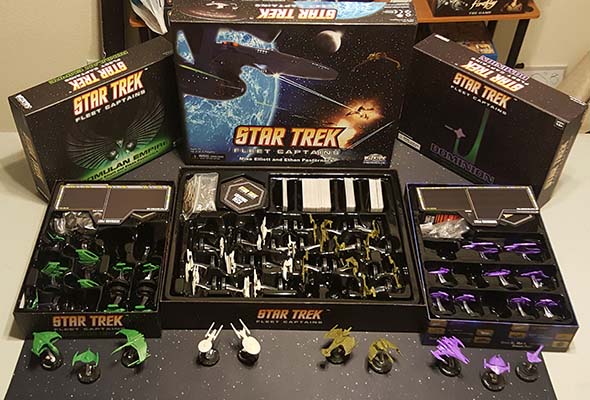
Star Trek: Fleet Captains has expansions for the Romulan Empire and Dominion.
Even though it is a kind of mediocre game, my friends and I liked Star Trek: Fleet Captains enough that we were excited to try out the game's expansions. There's a nice, episodic feel to the game that does do a pretty good job of capturing some of the feel of the source material. Fleet Captains has two expansions, which each offer a new playable faction: the Romulan Empire and the Dominion. Both expansions revolve around the same two core mechanics (espionage and saboteurs), but each has its own unique methods and techniques for how they utilize those mechanics. Since both expansions have similar features, I'm going to review both expansions together.
The Romulan Empire connives its way to victory
The Romulans are my favorite race in Star Trek I like Romulan makeup. I like their uniforms. I like their ship designs (especially the warbirds). I like their cunning. And I like the depictions of the Romulans in every era of Star Trek, except for Star Trek: Nemesis and Star Trek: Enterprise, which both managed to ruin a good thing. So opening the Fleet Captains box to find no Romulan ships was - of course - disappointing, and the very first thought that popped into my mind (after "Ooh, plastic space ships!") was "I should check if there's a Romulan expansion to this game". Sadly, it was sold out on Amazon, and eBay sellers wanted upwards of $150 for copies. I didn't want a Romulan expansion that badly... But my girlfriend, being awesome as she is, eventually saw the expansion come back in stock on Amazon and immediately ordered a copy for me to surprise me. So as I was getting ready to organize some game sessions to play the Dominion expansion and resigning myself to the idea that I'd never play the Romulans, a shiny, shrink-wrapped copy of the expansion literally showed up at my door step. She's a keeper!
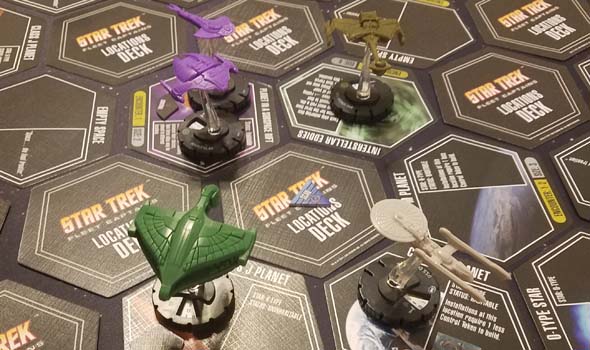
I don't like the monochrome ships, but at least the Romulan ships are the same color as in the show.
The green plastic of the Romulan ship miniatures fits well with the color schemes of Romulan ships in the shows, and the miniatures don't look as dull as the unpainted miniatures in the base game. The only Romulan ships that wouldn't be green would be Original Series Birds of Prey (or borrowed Klingon battle cruisers), which aren't included in the expansion's ship roster anyway. Instead, they included three Birds of Prey from Enterprise. That's a shame to me, since I really like the Original Series Bird of Prey's design - not as much as I like the TNG Warbird design, but the TOS Bird of Prey is up there in my list of favorite ships. I really would have liked to have seen one of the Enterprise Birds of Prey replaced with a TOS Bird of Prey in the roster, and maybe even a borrowed Klingon Battle Cruiser, but no such luck. Ah well... [More]
62e7d974-a66f-4dc9-8815-e176dc78759e|2|3.0
Tags:Star Trek: Fleet Captains: Romulan Empire, Star Trek: Fleet Captains: Dominion, Star Trek, Star Trek: Fleet Captains, board game, expansion, WizKids, Romulan, Dominion, Cardassian, Vorta, Jem Hadar, changling, shapeshifter, espionage, cloak, sabotage, defect, manufacturer defect, customer support, Star Trek: Enterprise, Mike Elliot, Ethan Pasternack
|

| 12 | | | | | | | 60 | | 11 | | | | | | | 55 | | 10 | | | | | | | 50 | | 09 | | | | | | | 45 | | 08 | | | | | | | 40 | | 07 | | | | | | | 35 | | 06 | | | | | | | 30 | | 05 | | | | | | | 25 | | 04 | | | | | | | 20 | | 03 | | | | | | | 15 | | 02 | | | | | | | 10 | | 01 | | | | | | | 05 |
|